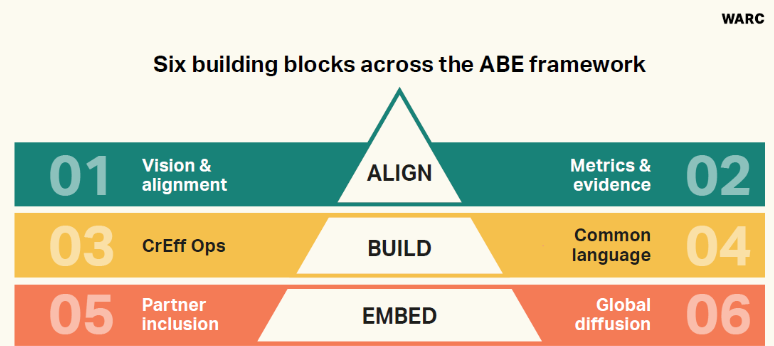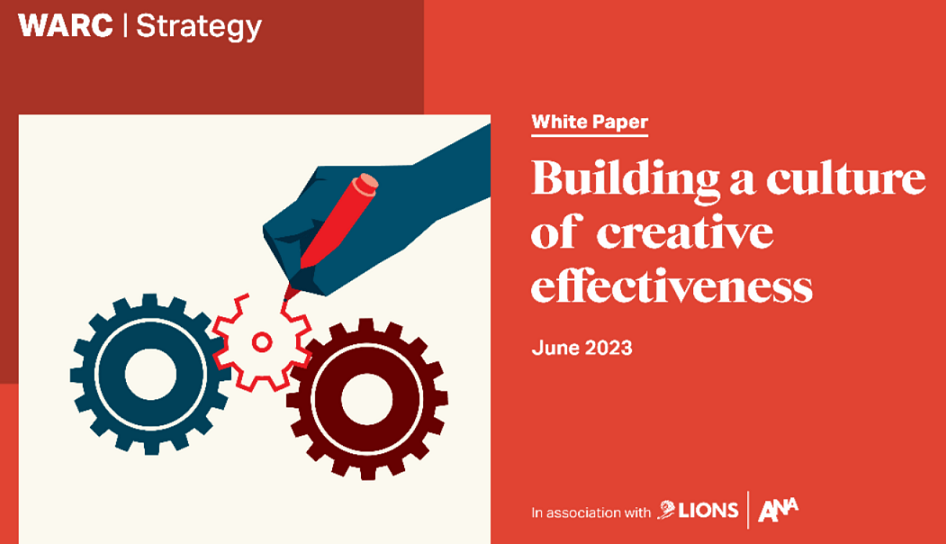Align, Build and Embed (ABE) – a new framework for brands to drive a culture of creative impact
Groundbreaking research by WARC, LIONS and ANA outlined in ‘Building a culture of creative effectiveness’ white paper
WARC, the global authority on marketing effectiveness, in association with LIONS and the Association of National Advertisers (ANA), has today released a white paper, ‘Building a culture of creative effectiveness’, outlining a new three-step framework to help brands develop a culture of creative impact to unlock growth.
The key challenges this white paper aims to solve is how marketing leaders can build a culture where creative marketing communications can be used to drive commercial outcomes and support the broader business agenda. And, in particular, where creativity can be applied to build brands capable of sustained growth and resistant to margin erosion.
From making the case to the CFO, to winning hearts and minds in the marketing team, to briefing and working with agencies – the study presents a unified framework, and shows how major brands have succeeded using its principles.
David Tiltman, SVP Content, WARC, says: “This white paper looks at an area too often overlooked when it comes to effectiveness: culture. Specifically, the culture within client organizations that unlocks true marketing-driven commercial impact.
“The more we research effectiveness, the clearer it becomes that it is a ‘team sport’, built on the efforts of multiple teams working together. It thrives when there is an aligned approach within the client organization, then a true partnership between a client and its agencies and other vendors. In short, culture is key.”
Bob Liodice, CEO, ANA, says: “Creativity is fundamental to best-in-class marketing, yet marketers appear to be finding it harder than ever to make the case for creative investment. This is why we were so pleased to partner with WARC and LIONS on this groundbreaking study, which looks at creativity and creative effectiveness through the often-overlooked lens of business culture.”
Jenni Middleton, SVP and Editor-in-Chief, LIONS, says: “At LIONS we know that great creativity drives business growth. For 70 years, we’ve been recognising the smartest creativity and its power to deliver results. From this experience, we know that a culture of creative effectiveness is one of the most fundamental aspects of delivering Lion-winning work.”
WARC’s framework for creative effectiveness identifies three main levels at which a brand organization, regardless of sector or size, needs to develop in order to deliver a culture of creative effectiveness. These are Align, Build and Embed – the ABE framework.
Align: Getting stakeholder management aligned across the C-suite, particularly the CEO and CFO.
Getting buy-in from the CEO and C-suite provides assurance of corporate support, including sign off on marketing budgets. Unsurprisingly, the stronger that buy-in at the top of the organizational pyramid, the greater the chances of building a successful effectiveness culture.
Build: Setting up leadership and central frameworks within the marketing team.
In order to drive a culture of creative effectiveness within a brand organization, there needs to be a clear operationalization of the themes central to the vision. This means creating the structures, processes, teams and decision-making hierarchies that will be essential to propagating the vision.
Embed: The sharing of systems and beliefs between marketers and their partners across planning, execution and measurement of marketing communications.
This is, ultimately, make or break. Changes in the broader economy, financial circumstances for the brand, or corporate management can undermine alignment at the top of the organization. The key to creating a persistent culture of creative effectiveness is to embed it as deeply and widely as possible. While it’s not an impregnable defense, the more widespread, evidence-backed and established thinking is within an organization, the harder it is to dismantle.

Across these three pillars, the research identified six different priorities for marketing leaders to address.
An extensive research and analysis process has led to the development of this framework, leveraging WARC’s unique Rankings database and in-depth interviews with brands, which have successfully delivered campaigns judged to be both creatively excellent and highly effective.
“The study we released today adds to a growing body of work that WARC has been developing in recent years,” said Aditya Kishore, Insight Director, WARC, “providing strategic insight on key elements of effective marketing. This includes the Anatomy of Effectiveness and Rethinking Brand for the Age of Digital Commerce, which focused on effective investment, while The Effectiveness Code and the Creative Effectiveness Ladder focus on measurement and creative commitment.
“But culture – the beliefs and behaviors within a client organization and shared with its partners – is the key to unlocking these effectiveness initiatives. As Peter Drucker famously said, ‘Culture eats strategy for breakfast.’”
‘Building a culture of creative effectiveness’ includes best practices, guidelines, expert commentary and examples of brand organizations that are successfully building a culture of creative effectiveness. The full report is available for WARC clients. A sample of the white paper can be read here.
The ABE framework will be presented today at the Cannes Lions International Festival of Creativity on the Terrace stage at 10:30 CET by WARC’s Aditya Kishore. He will be joined by Tariq Hassan, Chief Marketing and Customer Experience Officer, McDonald’s USA and Marques Gartrell, Global Executive Creative Director, McDonald’s, Wieden+Kennedy for a discussion on building a culture of creative effectiveness.
This framework is the first phase of a multi-phase initiative from WARC, LIONS and the ANA to support the development of a culture of creative effectiveness across brands. Future phases will look to develop beyond the basic framework into tools that can help measure and analyze a brand’s performance in its journey toward creative effectiveness.


